Book contents
- Frontmatter
- Contents
- Source Code Listings
- Preface
- 1 Introduction
- 2 General Principles
- 3 Formatting Conventions
- 4 Naming Conventions
- 5 Documentation Conventions
- 6 Programming Principles
- 7 Programming Conventions
- 8 Input and Output
- 9 Packaging Conventions
- 10 Generic Programming
- 11 Object Orientation
- 12 Parallel Processing
- 13 Numerical Types, Kinds, and Operations
- 14 C Interoperability
- 15 Updating Old Programs
- A Source Code
- B Rule List
- Bibliography
- Index
Preface
Published online by Cambridge University Press: 05 December 2011
- Frontmatter
- Contents
- Source Code Listings
- Preface
- 1 Introduction
- 2 General Principles
- 3 Formatting Conventions
- 4 Naming Conventions
- 5 Documentation Conventions
- 6 Programming Principles
- 7 Programming Conventions
- 8 Input and Output
- 9 Packaging Conventions
- 10 Generic Programming
- 11 Object Orientation
- 12 Parallel Processing
- 13 Numerical Types, Kinds, and Operations
- 14 C Interoperability
- 15 Updating Old Programs
- A Source Code
- B Rule List
- Bibliography
- Index
Summary
Audience
We wrote this book for anyone who writes programs using Fortran. We think it will be useful for the following categories of programmers:
Those who are learning Fortran from scratch and want to start on the right foot.
Those who are familiar with pre-modern FORTRAN (up to FORTAN 77) and would like to learn some of the new concepts and techniques of modern Fortran (Fortran 90 to Fortran 2008).
Those who have advanced knowledge of Fortran, have experimented with various styles, and are open to new ways to improve their programs.
Those who have experience with other languages, who know the importance of good coding style and who want to apply it to their Fortran code.
Those who want to create coding guidelines for teams of programmers, or establish a good style for a project.
General Considerations
The past four revisions of the Fortran Standard comprise alternating major and minor revisions, Fortran 90 and Fortran 2003 being the former, Fortran 95 and Fortran 2008 the latter. This book concentrates primarily on Fortran 2003. We present Fortran 90/95 methods and note where the techniques and methods of Fortran 2003 supercede them. Fortran 2008 capabilities are described, but to a lesser extent.
Each programmer will judge the importance of the new features of the language based on his or her experience and needs. The new C Interoperability may be very important to a programmer who often needs to build an application written in both languages.
Information
- Type
- Chapter
- Information
- Modern FortranStyle and Usage, pp. xiii - xviPublisher: Cambridge University PressPrint publication year: 2011
